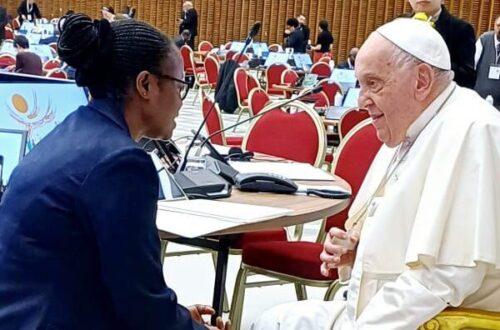Heritage and Spirituality Group
Luísa Maria Almendra, RSHM
(Part I)
Since the creation of the JPIC Group, we have begun a process of more conscious understanding and action of our interrelationship with Creation in its global and particular dimensions. In this context, the Encyclical Laudato Si’ has confirmed many of our intuitions for action as RSCM.
In an attempt to try to establish a relationship not only with this more recent past, but also with our origins I offer, on behalf of the Institute’s Heritage and Spirituality Group, a first visit to the words of Fr Gailhac. The aim is essentially to search in our heritage and spirituality for echoes which support our current action as an Institute and as Church. Today we present a brief introduction (Part I) to something that we wish could be continued.
Our planet is a gift, not a possession
(Laudato Si)
“Our common home can be compared sometimes to a sister with whom we share our existence and sometimes to a good mother who welcomes us into her arms” (LS 1). “Every year thousands of species of plants and animals disappear, which we will no longer be able to know, which our children will not be able to see, lost forever. (Because of us, thousands of species will no longer give glory to God by their existence, nor will they be able to communicate their own message to us. We have no right to do so” (LS 33).
If the human being, created in God’s image, has as his mission “to till and keep” the earth (Genesis 2:15), he is only an administrator, not the master…. The harmony between the Creator, humanity and the whole of creation has been destroyed because we have sought to take God’s place, refusing to recognize ourselves as limited creatures” (LS 66). “We are not God. The earth exists before us and has been given to us. (…). Each community can take from the goodness of the earth what it needs for its survival, but it also has the duty to protect it and to guarantee the continuity of its fertility for future generations” (LS 67).
___________
Fr. Gailhac
… When God created us, made us in his image, he breathed into us the Spirit of life, true life, supernatural life, the life of love which is his own life. (GS/9/VII/80/A*).
“How should we use the goods of the earth which God gives us: use them sparingly. Let nothing be lost, always what is necessary, not what is superfluous”. (GS/18/IX/83/A.). “Take care of all that you use…” (GS/9/XI/75/A).
Behind the world statistics on poverty, unemployment, migration, there are real people.
(Laudato Si)
“Often there is a lack of clear awareness of the problems that particularly affect the excluded. These are the majority of the planet, billions of people. Today they are mentioned in international political and economic debates, but it often seems as if their problems are placed as an appendix. (…) Indeed, when it comes to concrete implementation, they often remain in last place. This is partly due to the fact that many professionals, opinion formers, media and centers of power are located far from them” (LS 49).
“Let us not waste time in imagining the poor of the future, it is enough that we remember the poor of today, who have few years to live on this earth and cannot continue to wait” (LS 162).
___________
Fr. Gailhac
“As for the orphan children, gathered into the house by charity, they must be given a good education, sufficient to perform their task well, according to the place which providence destines for them… to achieve this constant, persevering action and patience are necessary.” (GS/3/IX/80/A*)
“We seek people, we want people, we work for them, we spend ourselves for them, we exhaust ourselves, we sacrifice ourselves for them, to save them. How beautiful is the life spent for Jesus Christ”. (GS/21/III/78/A)
Small gestures don’t save the planet, but they change our attention to others.
(Laudato Si)
“If a person habitually puts on a little more protection rather than heating, even though his savings allow him to consume and spend more, this presupposes that he has acquired convictions and ways of feeling favorable to the care of the environment. It is very noble to take on the duty of caring for creation with small daily actions, and it is wonderful that education is able to motivate to them to the point of shaping a lifestyle” (LS 211).
“We know that the behavior of those who consume and destroy more and more is unsustainable, while others still cannot live in accordance with their human dignity. Therefore, the time has come to accept a certain decrease in consumption in some parts of the world, providing resources so that it can grow in a healthy way in other parts” (LS 193).
___________
“Nothing is indifferent. The smallest things, like the biggest, everything must be ordered and taken care of. It is necessary, moreover, economy. Nothing superfluous, nothing fancy, nothing luxurious, but everything clean and convenient.” (GS/11/X/83/A.).
“To meet every need, you must maintain great discipline and perfect economy in all things. He must avoid superfluity in everything, see that nothing is spoiled either by forgetfulness or laziness or negligence.” (GS/s.d./5.).
Contemplation of the world is a path of Life.
(Laudato Si)
“The universe develops in God, who fills it completely. And so, there is a mystery to be contemplated in a leaf, on a path, in the dew, in the face of the poor. The ideal is not only to pass from exteriority to interiority in order to discover God’s action in the soul, but also to come to find Him in everything” (LS 233).
_________
Fr. Gailhac
“To obtain a good harvest, one must sow in autumn, let winter pass with its cold spells, go through spring and reap at the end of summer.” (GS/23/VIII/80/A.). “It is not enough to plant a tree, even in the best conditions; one must tend it, fertilize it, prune it, so that it may bear more fruit.” (GS/23/I/81/A.).
“I recommend to you especially His life of silence and recollection, union with God the Father, a life of continuous prayer, the care of spending the nights on the mountains to meditate on the Work of Redemption and to pay the homage that creatures refuse Him.” (GS/3/I/87/A*)
“There are very small birds that sing better than all the musicians in the world. They do not become conceited, remaining small.” (GS/16/III/81/A).








